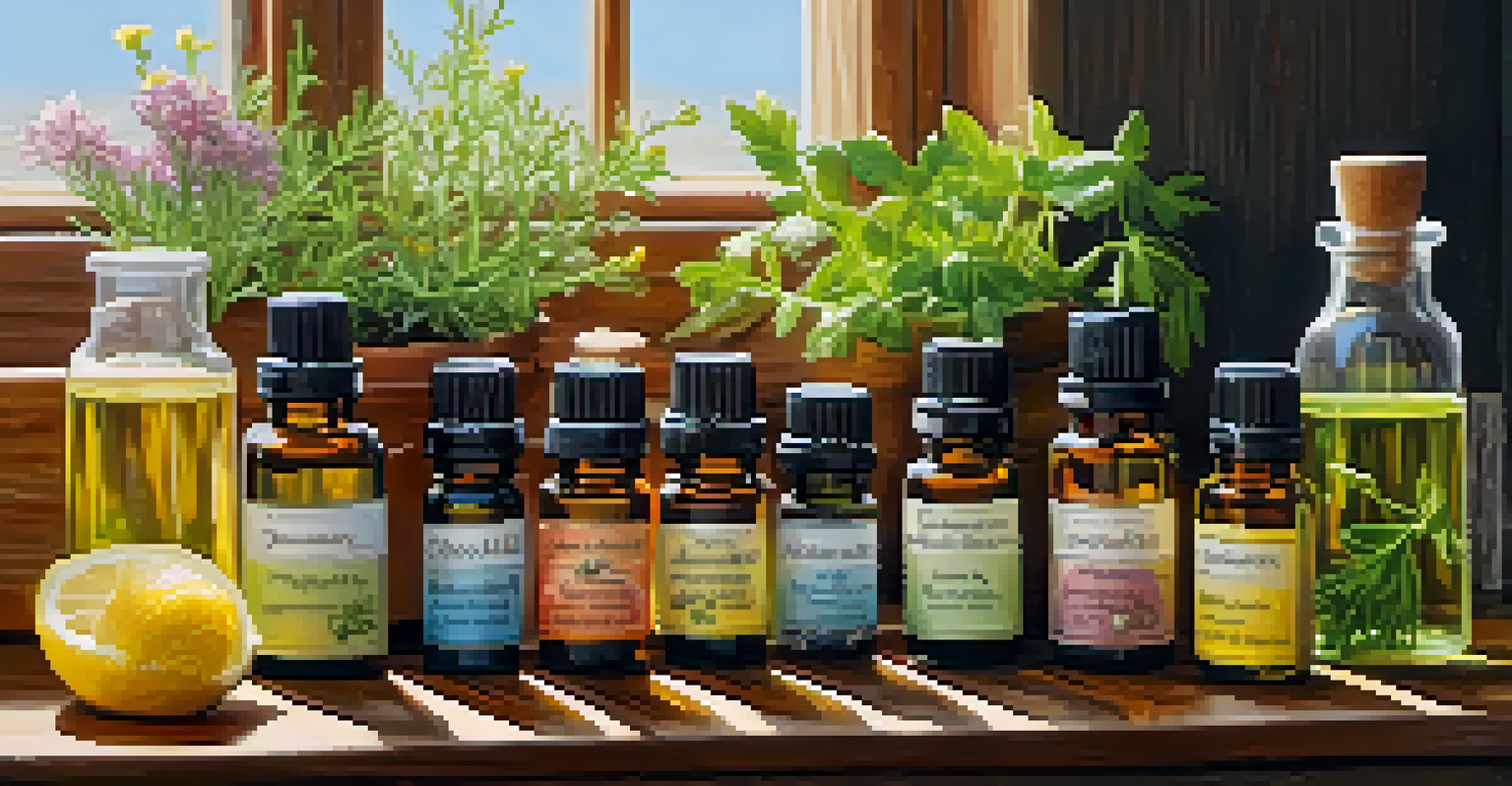Understanding Aromatherapy: Benefits of Essential Oils Today

What is Aromatherapy and How Does It Work?
Aromatherapy is a holistic healing practice that uses essential oils extracted from plants to promote physical and emotional well-being. These concentrated oils carry the natural fragrance and therapeutic properties of the plants, making them powerful tools for relaxation and healing. Through various application methods, such as inhalation or topical use, the aromas interact with our senses and can influence our mood and health.
The use of essential oils for health benefits is both an art and a science.
At its core, aromatherapy works by stimulating the olfactory system, which is closely connected to the brain's limbic system—the part responsible for emotions, memories, and behaviors. When we inhale these delightful scents, our brain responds, often leading to relaxation, stress relief, or even energy boosts. It's fascinating how something as simple as a pleasant aroma can have such profound effects on our mental state.
In modern wellness practices, aromatherapy has gained popularity as a complementary therapy for various conditions. Whether it’s using lavender for sleep or peppermint for headaches, many people are turning to essential oils as a natural alternative to pharmaceuticals. This growing trend has led to a deeper understanding of the powerful benefits of these fragrant oils.
The Science Behind Essential Oils: What You Should Know
While aromatherapy may seem like a mystical art, there's solid scientific backing to its efficacy. Essential oils contain complex chemical compounds that can interact with our bodies at a cellular level. For instance, the calming effects of chamomile are attributed to its flavonoids, which have been shown to reduce anxiety and promote relaxation.

Research has indicated that certain essential oils can stimulate the release of neurotransmitters such as serotonin and dopamine, which play crucial roles in mood regulation. This connection between scent and brain chemistry helps explain why inhaling certain oils can uplift our spirits or soothe our minds. It’s like having a little mood booster in a bottle!
Aromatherapy Enhances Well-being
Aromatherapy uses essential oils to promote relaxation and emotional health through scent.
However, it’s important to approach aromatherapy with a balanced perspective. While essential oils can certainly enhance well-being, they should not replace professional medical advice or treatment. Knowing the science behind these oils allows us to appreciate their potential while also respecting their limitations.
Popular Essential Oils and Their Benefits
There’s a vast array of essential oils available, each offering unique benefits. For example, lavender is renowned for its calming properties, making it a popular choice for promoting better sleep and reducing anxiety. On the other hand, citrus oils like lemon and orange are often uplifting and energizing, perfect for brightening your mood during a dull day.
Aromatherapy is a holistic approach to healing, allowing us to tap into the power of nature.
Tea tree oil, known for its antibacterial and antifungal properties, is a favorite in natural skincare routines. Many people use it to treat minor cuts or blemishes, showcasing the versatility of essential oils beyond mere fragrance. Each oil has its own set of characteristics, making it essential to choose the right one for your specific needs.
Exploring the world of essential oils can be a delightful journey. With so many options available, it’s like curating a personal wellness toolkit tailored to your lifestyle. Whether you prefer a relaxing blend for your evening routine or a refreshing scent to start your day, there’s an oil for every occasion.
How to Use Essential Oils Safely and Effectively
While essential oils offer numerous benefits, safety is paramount when using them. Always dilute essential oils with a carrier oil, such as coconut or jojoba oil, before applying them to the skin. This precaution helps minimize the risk of irritation and ensures a more pleasant experience. For those new to aromatherapy, starting with a patch test on a small area of skin is a wise choice.
Inhalation is another popular method of using essential oils. Whether through a diffuser, a personal inhaler, or simply adding a few drops to a bowl of hot water, the right approach can create an inviting atmosphere while promoting relaxation. Just remember to use essential oils in moderation—less is often more when it comes to their potent aromas.
Science Supports Essential Oils
Research shows that essential oils can influence mood by interacting with neurotransmitters in the brain.
Lastly, understanding the specific oils you’re using is crucial. Some oils may not be suitable for pregnant women, children, or individuals with certain health conditions. Always do your research and consult with a healthcare professional if you have concerns. By using essential oils responsibly, you can enjoy their benefits while ensuring your safety.
The Role of Aromatherapy in Stress Relief
In today's fast-paced world, stress relief is more important than ever, and aromatherapy offers a natural solution. Many essential oils are known for their calming effects, helping to lower stress levels and promote a sense of peace. For example, the scent of bergamot has been shown to reduce feelings of anxiety and boost mood, making it a popular choice for stress relief.
Incorporating aromatherapy into your daily routine can be simple. Consider diffusing calming scents in your workspace or adding a few drops of essential oil to your bath for a soothing experience. By creating a calming environment, you can combat stress effectively and foster a sense of well-being throughout your day.
Moreover, the ritual of using essential oils can itself be a form of self-care. Taking a moment to breathe deeply and savor a pleasant aroma can provide a much-needed pause in our busy lives. This mindful practice not only helps to reduce stress but also encourages a deeper connection with ourselves.
Aromatherapy for Better Sleep: Essential Oils to Try
Struggling to get a good night's sleep? Aromatherapy might just be the solution you need. Certain essential oils, such as lavender and chamomile, have been shown to promote relaxation and improve sleep quality. By incorporating these scents into your bedtime routine, you can signal your body that it’s time to unwind.
One simple method is to diffuse these oils in your bedroom before sleep or add a few drops to your pillowcase. The soothing aromas can help create a tranquil atmosphere conducive to rest. You might also consider a warm bath with essential oils to further promote relaxation before bedtime.
Safe Use of Essential Oils Matters
Diluting essential oils and understanding their properties is crucial for safe and effective use.
Additionally, some people find that creating a bedtime ritual that includes aromatherapy helps signal to their body that it’s time to sleep. This can be as simple as taking a moment to breathe in a calming scent or practicing gentle stretches while surrounded by your favorite essential oils. By making aromatherapy a part of your sleep routine, you can enhance your overall sleep experience.
The Future of Aromatherapy: Trends and Innovations
As interest in holistic health continues to grow, the future of aromatherapy looks promising. Innovations in essential oil extraction and formulation are making high-quality oils more accessible than ever. This means that more people can experience the benefits of aromatherapy and integrate it into their daily lives.
Moreover, the rise of technology is influencing how we use essential oils. Smart diffusers and apps that guide users through personalized aromatherapy routines are becoming increasingly popular. These advancements not only enhance the user experience but also provide a deeper understanding of how specific oils can support individual wellness goals.

With ongoing research into the therapeutic properties of essential oils, we can expect to see even more applications for aromatherapy in the future. As we uncover new benefits and uses, aromatherapy will likely continue to evolve, making it a relevant and valuable tool in modern wellness practices.